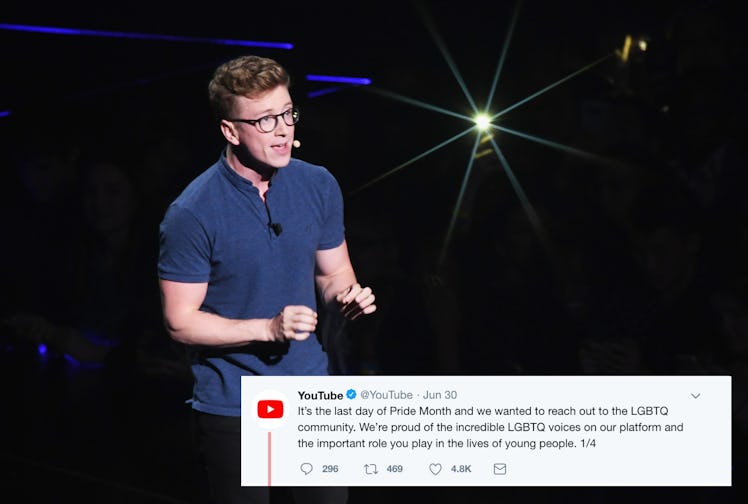
YouTube Apologized For The LGBTQ Advertising Controversy & Hopefully Things Will Actually Change
Almost a year and half after LGBTQ content creators on YouTube first lambasted the media site for de-monetizing their videos, the company quietly posted a written apology to Twitter on June 30. The media company had previously blamed the de-monetization of certain channels as being related to the videos containing what it called "restricted content," but the sorting of videos by YouTube inhibited LGBTQ content creators from making money by way of video advertising. YouTube apologized for the LGBTQ advertising controversy, and hopefully things will actually change — but I'm not optimistic.
The company apologized both for a series of anti-LGBTQ advertisements that aired recently on LGBTQ creators' channels, as well as for the sloppy rollout of its monetization selection process dating back a few years. The company said in a series of tweets,
It’s the last day of Pride Month and we wanted to reach out to the LGBTQ community ... we’ve also had issues where we let the LGBTQ community down — inappropriate ads and concerns about how we’re enforcing our monetization policy. We're sorry and we want to do better. We’ve taken action on the ads that violate our policies, and we are tightening our enforcement. And when we hear concerns about how we’re implementing our monetization policy, we take them seriously and make improvements if needed.
The two-pronged apology is meant to address two major controversies — ad monetization and anti-LGBTQ advertising. Back in March 2017, LGBTQ creators started noticing that their ability to make money from advertisements before their videos was hindered by what YouTube calls "restricted" videos. At the time, YouTube responded by saying that restricted mode was a feature intended to filter out mature content for certain viewers — therefore, advertising privileges were revoked from videos that YouTube deemed contained "mature" content.
LGBTQ creators argued that the content being blocked by YouTube wasn't "mature" at all — it was, simply, LGBTQ-related.
British YouTuber NeonFiona told the U.K.'s The Guardian newspaper at the time that videos of hers referencing having a girlfriend, or overtly mentioning her bisexuality, became restricted. Videos that didn't mention her partner's gender were allowed to be monetized, she claimed, adding that heterosexual sex was not deemed "mature" by YouTube's system.
YouTube's statement in March 2017 used phrases like "we regret any confusion this has caused" and "we appreciate your feedback," which some took to mean they weren't taking it seriously. Months went by, and LGBTQ creators continued experiencing de-monetization issues.
Then, the LGBTQ advertising controversy was bumped up a few notches when some LGBTQ creators in June started noticing anti-LGBTQ advertising on their channels. Again, YouTube delivered a lackluster apology, and essentially said, "well, if you don't want those kinds of ads, you have the opportunity to block them yourself," citing a feature that few knew about beforehand.
“We have policies against ads on YouTube that incite hatred or promote discrimination, and all ads that run on the platform have to comply with these policies," YouTube said in a statement to The Advocate in June. "Even when an ad does not violate our policies, we understand that creators may not want ads from certain advertisers appearing on their videos. That’s why we give creators the ability to block ads from an advertiser in their AdSense account. We also give creators the option to block certain categories of ads if they choose.”
You might be thinking, well, is it that big of a deal, really? Can't content creators just file a complaint with YouTube and prove their video isn't containing mature content? For LGBTQ YouTubers who are pumping out content weekly, or even daily, it can be extremely labor intensive to make sure all their videos are being labeled properly. When it's your livelihood, you depend on that revenue.
Even aside from the financial component, LGBTQ YouTube is a very special place that has blanketed sexual minorities with comfort and companionship. And for trans youth, it can be a provider of reliable and life-affirming information.
Gigi Lazzarato, a trans YouTube star who is featured in a documentary about her transition, noticed that some of her videos were swept up in the restricted mode controversy. In March 2017, she told Niraj Chokshi at The New York Times, that her content can be educational for children struggling with their identity. “That video might be the ultimate tipping point for them in their transition,” she said.
For many, YouTube's acknowledgement on the final day of Pride month was yet another in a series of disappointing apologies to the LGBTQ community. "It's so easy telling a community how important their work is without actually doing anything further," YouTuber Chris Lam tweeted.
Hopefully, YouTube does take action, and it won't take more years to tweak the policy and get things in working order for LGBTQ content makers. YouTube needs LGBTQ creators, but more importantly, there's an entire audience of LGBTQ youth out there who rely on the folks in front of the camera who are brave enough to bare it all so that others can feel less alone.